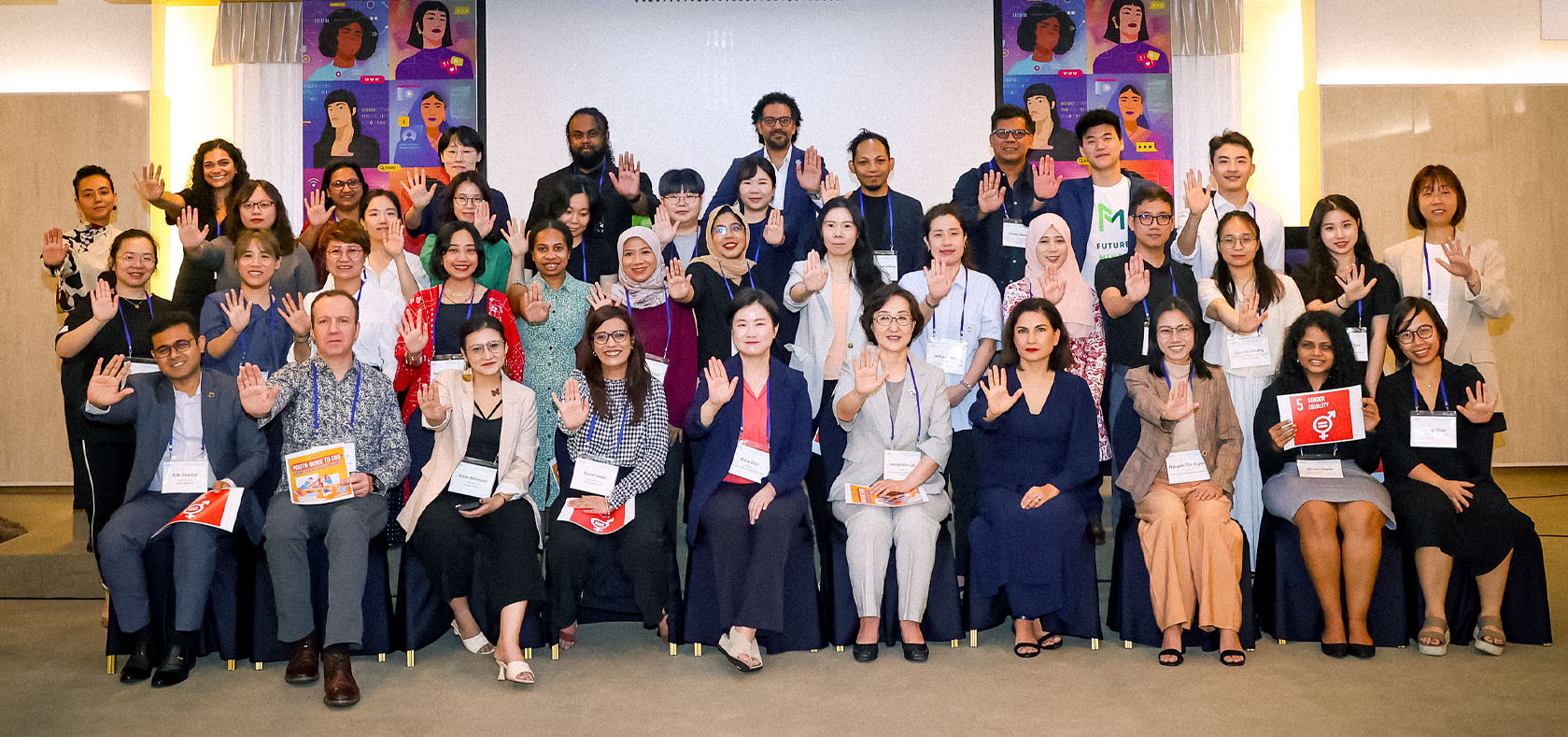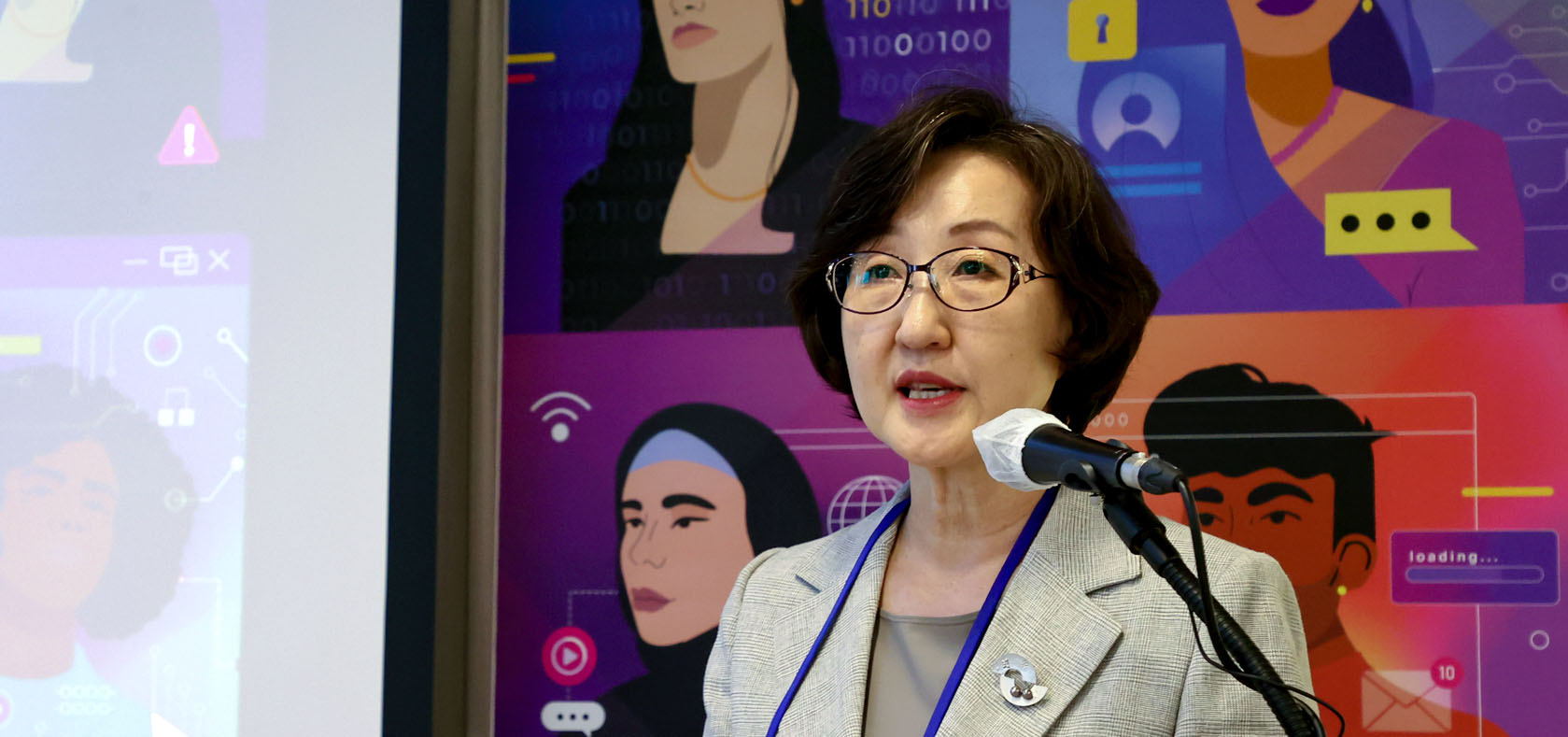[Press release]

Young leaders and experts from 13 countries in the Asia-Pacific region are taking a group photo. Photo: UN Women/Kwanju Kim
English | 한국어
Seoul, Republic of Korea – Forty-five youth leaders and experts from 13 countries in the Asia-Pacific region are in the Republic of Korea to participate in a three-day cross-country learning on empowering youth to address the technology-facilitated gender-based violence (TF GBV).
According to UN Women, TF GBV is any act that is committed, assisted, aggravated or amplified by the use of information communication technologies or other digital tools which results in or is likely to result in physical, sexual, psychological, social, political or economic harm or other infringements of rights and freedoms. These are forms of violence that are directed against women because they are women and/or that affect women disproportionately.
The UN Women Centre of Excellence for Gender Equality and the Asia-Pacific Regional Office are jointly hosting the event, titled Cross-Country Learning on Empowering Youth to Address TF GBV, from 22 to 24 August. This training aims to facilitate the exchange on the existing tools, knowledge and lessons learned on addressing TF GBV among the youth leaders from the Asia-Pacific region, and to develop country-specific plans of actions for implementation.
The youth leaders are the members of "30 for 2030 Network," established by UN Women Regional Office for Asia and the Pacific in July of last year. The Network brings together young decision-makers, eminent civic and business innovators, feminists, entrepreneurs, technology pioneers, educators, activists, artists, journalists, and more. The Network has been organized to bring youth leaders to the centre of sustainable development by influencing social change and policymaking.
This event highlighted the fact that TF GBV has become a significant problem all around the world. Globally, 85 percent of women have experienced online violence or know someone who has, and this percentage rises to 88 percent in the Asia-Pacific region. Participants are attending from Australia, Bangladesh, China, Fiji, Indonesia, Malaysia, the Philippines, Pakistan, Republic of Korea, Singapore, Sri Lanka, Thailand, and Viet Nam.
On the first day, participants reviewed the current evidence and patterns of GBV facilitated by technological advancements, along with legal systems and initiatives related to addressing such violence. On the second day, they will examine these response methods through case studies and engage in networking with experts. The final day involves developing action plans backed up with monitoring and evaluation frameworks, and presentations on such plans.

Jeongshim Lee, director of the UN Women Centre of Excellence for Gender Equality, is opening the three-day event ‘Cross-country learning on empowering youth to address online gender-based violence.’ Photo: UN Women/Kwanju Kim
Jeongshim Lee, director of the UN Women Centre of Excellence for Gender Equality, stated: "Young people are consistently showing us what it means to be a change-maker and demand a more equal world for women and girls around the world." She added that this learning is a safe space for youth and all stakeholders to identify ways to engage youth in addressing TF GBV in the Asia-Pacific region.
At the event, youth leaders will have a chance to reflect upon and gear up for the release of the second edition of the Youth Guide to End Online Gender-Based Violence Toolkit. This will further be emphasized with a campaign during the 16 Days of Activism to End Violence Against Women, scheduled for November. This toolkit, a product of the 30 for 2030 Network, stands as a practical guide for learning and action. The first edition was published in December of last year, with the support from the UN Women Centre of Excellence for Gender Equality, funded by the Government of the Republic of Korea.
Melissa Alvarado, Specialist of the Ending Violence against Women Regional Programme, remarked: "The significant role of youth in combatting TF GBV is undeniable." She further stated: "With their innovation, courage, and digital acumen, they emerge as pivotal partners in crafting a safer online world for all."
Attending the opening, Bora Shin, the president of Women’s Human Rights Institute of Korea, congratulated the UN Women Centre of Excellence for Gender Equality for its target efforts in serving Asia and the Pacific region as a knowledge hub to facilitate the sharing of innovations and lessons learned, networking, and development of multi-stakeholder partnerships to address TF GBV. She also added that her institute will work hard to fight against violence with victims together.
Established in Seoul last year, the UN Women Centre of Excellence for Gender Equality works to improve the implementation of normative and policy frameworks and address discriminatory social norms and practices that perpetuate gender inequality in the Asia-Pacific region.

